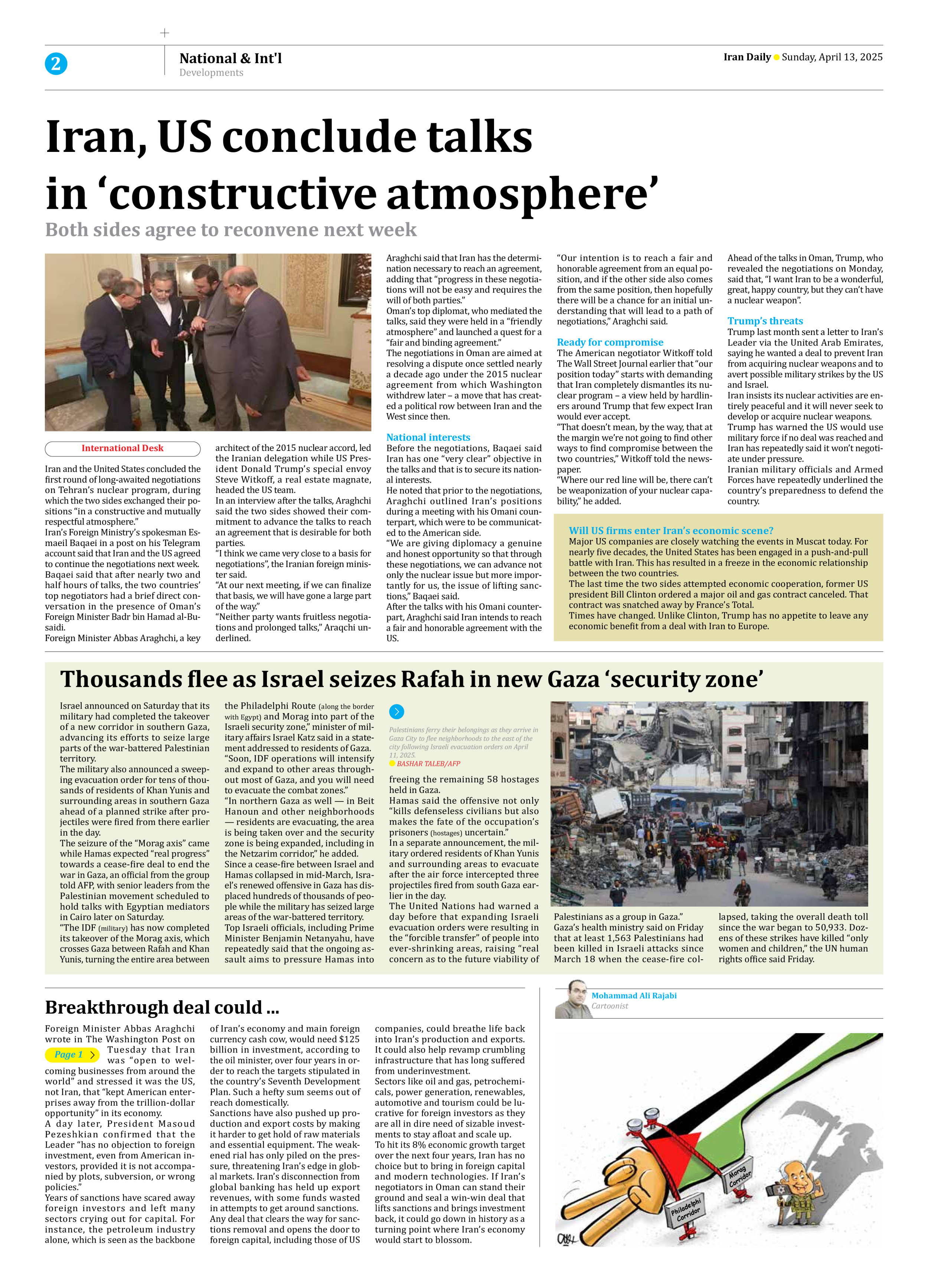
Iran, US conclude talks in ‘constructive atmosphere’
Both sides agree to reconvene next week
Iran and the United States concluded the first round of long-awaited negotiations on Tehran’s nuclear program, during which the two sides exchanged their positions “in a constructive and mutually respectful atmosphere.”
Iran’s Foreign Ministry’s spokesman Esmaeil Baqaei in a post on his Telegram account said that Iran and the US agreed to continue the negotiations next week.
Baqaei said that after nearly two and half hours of talks, the two countries’ top negotiators had a brief direct conversation in the presence of Oman’s Foreign Minister Badr bin Hamad al-Busaidi.
Foreign Minister Abbas Araghchi, a key architect of the 2015 nuclear accord, led the Iranian delegation while US President Donald Trump’s special envoy Steve Witkoff, a real estate magnate, headed the US team.
In an interview after the talks, Araghchi said the two sides showed their commitment to advance the talks to reach an agreement that is desirable for both parties.
“I think we came very close to a basis for negotiations”, the Iranian foreign minister said.
“At our next meeting, if we can finalize that basis, we will have gone a large part of the way.”
“Neither party wants fruitless negotiations and prolonged talks,” Araqchi underlined.
Araghchi said that Iran has the determination necessary to reach an agreement, adding that “progress in these negotiations will not be easy and requires the will of both parties.”
Oman’s top diplomat, who mediated the talks, said they were held in a “friendly atmosphere” and launched a quest for a “fair and binding agreement.”
The negotiations in Oman are aimed at resolving a dispute once settled nearly a decade ago under the 2015 nuclear agreement from which Washington withdrew later – a move that has created a political row between Iran and the West since then.
National interests
Before the negotiations, Baqaei said Iran has one “very clear” objective in the talks and that is to secure its national interests.
He noted that prior to the negotiations, Araghchi outlined Iran’s positions during a meeting with his Omani counterpart, which were to be communicated to the American side.
“We are giving diplomacy a genuine and honest opportunity so that through these negotiations, we can advance not only the nuclear issue but more importantly for us, the issue of lifting sanctions,” Baqaei said.
After the talks with his Omani counterpart, Araghchi said Iran intends to reach a fair and honorable agreement with the US.
“Our intention is to reach a fair and honorable agreement from an equal position, and if the other side also comes from the same position, then hopefully there will be a chance for an initial understanding that will lead to a path of negotiations,” Araghchi said.
Ready for compromise
The American negotiator Witkoff told The Wall Street Journal earlier that “our position today” starts with demanding that Iran completely dismantles its nuclear program – a view held by hardliners around Trump that few expect Iran would ever accept.
“That doesn’t mean, by the way, that at the margin we’re not going to find other ways to find compromise between the two countries,” Witkoff told the newspaper.
“Where our red line will be, there can’t be weaponization of your nuclear capability,” he added.
Ahead of the talks in Oman, Trump, who revealed the negotiations on Monday, said that, “I want Iran to be a wonderful, great, happy country, but they can’t have a nuclear weapon”.
Trump’s threats
Trump last month sent a letter to Iran’s Leader via the United Arab Emirates, saying he wanted a deal to prevent Iran from acquiring nuclear weapons and to avert possible military strikes by the US and Israel.
Iran insists its nuclear activities are entirely peaceful and it will never seek to develop or acquire nuclear weapons.
Trump has warned the US would use military force if no deal was reached and Iran has repeatedly said it won’t negotiate under pressure.
Iranian military officials and Armed Forces have repeatedly underlined the country’s preparedness to defend the country.
Will US firms enter Iran’s economic scene?
Major US companies are closely watching the events in Muscat today. For nearly five decades, the United States has been engaged in a push-and-pull battle with Iran. This has resulted in a freeze in the economic relationship between the two countries.
The last time the two sides attempted economic cooperation, former US president Bill Clinton ordered a major oil and gas contract canceled. That contract was snatched away by France’s Total.
Times have changed. Unlike Clinton, Trump has no appetite to leave any economic benefit from a deal with Iran to Europe.







